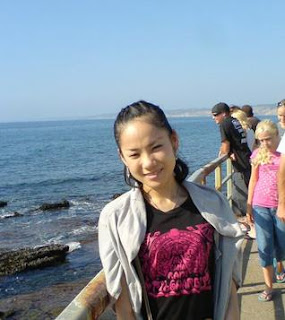

Our Environmental and Natural Resources Law and Policy program is renowned for its student diversity. We'd like to highlight our international students and their very interesting backgrounds. The first one in this series is
Veronica Morelli, an LLM student from Peru who has an extremely interesting background.
1. Where are you originally from? And where did you grow up? Tell us about your home city or region.
I was born and raised in Lima, Peru. Lima is the capital of Peru, located in the coast of the Pacific Ocean, and home of 9 of the 30 million total population of Peru.
2. What is your educational background? When and where did you attend school and university?
I studied Law in the Peruvian University of Applied Sciences (UPC), in Lima, Peru.
3. What experiences have you had, thus far in your career, in terms of addressing environmental or natural resources issues?
I've gained all my professional experience addressing environmental and natural resources issues at PERU LNG S.R.L, the company that built and currently operates the first LNG (Liquefied Natural Gas) business in South America. The project required the elaboration and approval of several Social Environmental Impact Assessments, permitting for the use of natural resources (like water permits), land use planning and easements negotiation along PERU LNG's own 408 kilometer pipeline, port and marine permits and certifications, among others.
In addition, PERU LNG obtained a loan of $800 million from the International Development Bank, which constituted the largest loan for a private project ever made in Peru; the application for this financing required PERU LNG to meet several international environmental and social standards and guidelines, which were implemented by PERU LNG and its compliance is constantly supervised by lenders and Peruvian regulatory entities.
My work as an in house lawyer of PERU LNG has been to support the social and environmental teams in the previously described tasks.
4. What are the key environmental and natural resources issues in your home country?
Water quality, air pollution in urban areas, illegal mining and illegal timber.
5. You have chosen to study at Denver Law. Why did you make this choice and what are you hoping to learn and experience while you are here?
I decided to look for an LLM program that can expand my expertise in energy, environmental and natural resources, rather than a general LLM.
Searching for that special program, I studied very carefully the LLM options in various USA and European universities, including in my evaluation not only the academic aspects, but also the location of those universities and the living experience they offer. I concluded that Denver University was the best option to take, not only for having a highly ranked program, but also for its well defined course menu, its high quality professors, and its wonderful location in Denver, which is a quiet and beautiful city.
I'm hoping to learn more about energy and environmental law but with an international perspective. At the same time, I'm hoping to have a great living experience, enjoy the outdoors, make friends from different countries, and enjoy that experience with my husband (Eduardo Paseta) who is also an LLM student.
6. What is your personal philosophy or point of view in terms of the relationship of the environment and natural resources?
My answer is driven by my professional experience in the natural resources extractive sector. I believe that natural resources shall be developed responsibly and in harmony with the environment; the environmental and social aspects constitute the main consideration at the moment of making an investment decision, and continue being an important and core aspect during the development of the activity. Nowadays, it's inconceivable to think about the use of natural resources without having as a principal matter consideration of the environmental aspects involved in the execution of said activity.
7.Tell us something you would like us to know about your country.
Peru is a rich country in terms of natural resources and biodiversity. It is a huge scenario of altitudinal ecological zones (eco-stratas) and live species that make it one of the most important focuses of biodiversity in the world.
According to a report from the World Bank in 2007, Peru is among the 12 countries that have 70% of the biological diversity in the Earth. Peru is also one of the world centers of genetic resources of flora and fauna. For example, Peru is the only country with more than 3,000 varieties of potato, 36 species of corn and a notable variety of grains and Andean roots.
In addition, Peru has 650 species of fruits and 787 varieties of eating, medical and ornamental plants. Moreover, Peru has 128 species of domesticated native plants. From 4 of the most important crops for the alimentation of human kind (corn, wheat, rice and potato), Peru has a high genetic biodiversity in 2 of them: potato and corn. Finally, Peru has 28 of the 32 existing climates in the world, and in any of its 11 altitudinal ecological zones, new varieties of live species can still be found.
8. What is something about you that most people don't know about (for example, do you have an unusual hobby or have perhaps have had an unusual experience in your life)?
I don't have an unusual hobby nor have had an unusual experience in my life, but I guess most people don't know that I have a great ability for writing, and that one of my dreams is to write a novel someday.
9. Who are your professional role models?
My oldest sister, Marta.
10. What are your plans after completion of your degree?
In the professional aspect, and as an immediate plan, I will return to Peru and continue working at PERU LNG. In the personal aspect, my husband and I are planning to start a family and have our first daughter/son.
 Dr. David Makongo PhD., a Denver Law '06 JD graduate as well as an '05 LLM graduate, has established Makongo & African Partners LLC (MAP LLC), a firm with expertise in African mining and oil and gas issues.
Dr. David Makongo PhD., a Denver Law '06 JD graduate as well as an '05 LLM graduate, has established Makongo & African Partners LLC (MAP LLC), a firm with expertise in African mining and oil and gas issues.
 Sheila Slocum Hollis
Sheila Slocum Hollis






 Denver Law
Denver Law

 Will Sarni
Will Sarni






 Denver Law's Environmental and Natural Resources Law Program
Denver Law's Environmental and Natural Resources Law Program 





